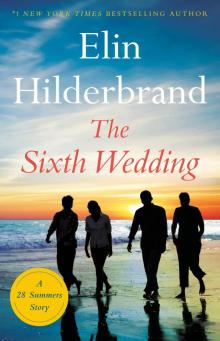- Home
- Elin Hilderbrand
Barefoot: A Novel Page 20
Barefoot: A Novel Read online
Page 20
You will never work in academia again, Suzanne Atela had said, the harshness in her voice belied by her lilting Bahamian accent. I will see to it personally. As for the vandalism charges . . .
Vandalism charges: The phrase sounded so crass, so trashy. Vandalism was a teenage girl taking a Sharpie to the bathroom wal , it was hoodlums spray-painting the skateboard park or breaking the front window of a pizzeria. It had nothing to do with Brenda and Mrs. Pencaldron exchanging words in the Barrington Room. But Brenda had been so, so angry, so confused and frustrated; she had wanted to throw something!
Even as Mrs. Pencaldron shrieked and ordered Augie Fisk to stand in the doorway, lest Brenda try to escape, even as campus security arrived, Brenda could not take her eyes off the painting. The nasty black snarl mesmerized her; it was like hair caught in a drain, like real feelings shredded by a series of bad decisions.
A hundred and sixty thousand dol ars, plus legal fees. This was only the monetary price; this did not even begin to address the damage done to Brenda’s reputation. She would never work in academia again.
Call John Walsh! the note shouted. But no, she couldn’t do it. She shut off her phone.
The first of July came and went—and stil there was no sign of the two hundred and ten dol ars from Didi. Josh wasn’t surprised; lending money to Didi was as good as flushing it down the toilet. He wrote a threatening letter to Didi in his journal ( You need to grow up! Take responsibility for your actions! You can’t keep jumping in the deep end and then crying out because you’re drowning! ). Writing was cathartic, and Josh decided to count himself lucky for not enabling Didi a second time. When she’d asked for more money, he had said no, and he hadn’t heard from her since. She did not appear in the parking lot of Nobadeer Beach and she had stopped leaving drunk, late-night messages on his cel phone. Josh would have been happy to let the loan fade from his memory, but the problem was that somebody—Josh would never know who—had mentioned the loan to Tom Flynn, and in the world of Tom Flynn, when you lent out money that you’d earned with your own two hands, you should damn wel make a point to get it back. Much to Josh’s dismay, the topic came up at dinner.
“You lent the Patalka girl money?”
Josh had started dating Didi sophomore year in high school—so, six years earlier—and Tom Flynn stil (and had always) referred to her as “the Patalka girl.”
“She was in a pinch, she said.”
“She always says. Doesn’t she have a job now?”
“At the hospital,” Josh said, though his father knew this.
“Then why . . .”
“Because she was in a pinch, Dad,” Josh said. He did not want to be tricked into saying anything more. “I’l get it back.”
“See that you do,” Tom Flynn said. “What’s yours is yours. You aren’t working to support her. She doesn’t have col ege bil s to pay.”
“I know that, Dad,” Josh said. “I’l get it back.”
Tom Flynn said nothing else, which was unfortunate because the “I’l get it back” hung in the air as the final words on the topic, making them into a promise Josh knew he couldn’t fulfil . He would never, in a mil ion years, cal Didi up to ask for the money, if for no other reason than she obviously didn’t have it and any exchange with her on the topic would be depressing and pointless.
And so, when Vicki mentioned, a few days later, that she wanted Josh to join them on an evening picnic out to Smith’s Point on Saturday night, he said yes right away, thinking it would mean another hundred dol ars that he could tel his father was from Didi. But it quickly became clear that Saturday night wasn’t an invitation to work; it was simply an invitation. The Three were getting lobster dinners from Sayle’s, they were going to build a bonfire and make s’mores with the kids, they were going to light sparklers and locate constel ations and, if the water was warm enough, go for a nighttime swim.
“My husband, Ted, wil be there,” Vicki said. “I real y think it’s time you two met and hung out a little.”
At that point, Josh tried to backpedal. His role at Number Eleven Shel Street was becoming blurry enough without having him join in on family beach picnics. And the last thing Josh wanted to do was meet Ted Stowe. Normal y, Josh left Number Eleven at one o’clock on Friday afternoon and Ted arrived around four; Ted left on Sunday night and Josh returned at eight o’clock on Monday morning. With this schedule in place, Josh had hopes of avoiding Ted Stowe altogether—at least until Ted took his vacation at the end of August. Josh feared two things from Ted Stowe—his dislike (already in place) and his judgment. Josh, in one fleeting but beautiful moment, had kissed Brenda, and now he was starting to pick up funny vibes from Melanie. Ted might perceive this; he might, as the only other man in the house, sense a connection between Josh and one or more of the women. Josh didn’t want to get fired, or beat up, by Ted Stowe. And so, a day after he’d agreed to go on the beach picnic, he took the path of least resistance and approached Brenda.
He caught her on his way out to his Jeep at one o’clock. She was returning from the beach with her notebook, her thermos, and her cel phone.
“How goes the screenplay?” he said.
“Don’t ask,” she said.
“Okay,” he said. “I won’t. Hey, listen—I can’t make the picnic thing on Saturday night. I just remembered, I have something else. You’l tel Vicki?”
Brenda gnawed her lower lip. “Ohhhh,” she said. “Shit.”
“What?”
“Vicki real y wants you to come,” Brenda said. “I mean, she’s talked about how much she wants you there. To meet Ted. He’s bringing fishing rods so you guys can surf cast.”
“Us guys?” Josh said. “Surf cast?”
“With Blaine,” Brenda said. She took a deep breath; her chest rose and fel . Josh tried not to look. She was in love with someone else. “I’m afraid if you cancel, Vicki wil do something funny. Like bag the whole thing. With the way she is now, that’s exactly what she’l do. Toss the whole night out the window. And it’s real y important that we get her out. We have to boost her spirits.”
“Right,” Josh said. “But it’s a family picnic. I’m not a part of your family.”
“Neither is Melanie,” Brenda said. “And she’s going.”
Josh looked at the ground. Thinking about Melanie only confused him further.
“Is there any way you can reschedule the other thing?” Brenda said. “Any way at al ?” She lowered her voice. “I’m happy to pay you.”
“No, no, no,” Josh said quickly. He felt like his true motivation had been discovered and it embarrassed him. “You don’t have to pay me. I’l come.”
Brenda looked so happy and so relieved that Josh thought she might kiss him again. But no such luck. She just smiled in a real y nice way and touched his arm. “Thank you,” she whispered. “Thank you.”
T he high-performance rating of two fishing rods bought from Urban Angler on Fifth Avenue, the Yukon’s tire pressure, four wooden pallets
“borrowed” from the Stop & Shop, five adult lobster dinners complete with boiled new potatoes, corn on the cob, Caesar salad, buttermilk biscuits, half a dozen cherrystone clams, and a two-pound cooked and cracked lobster with drawn butter, a cooler full of Chardonnay and Stella Artois, three perfectly whittled roasting sticks, a box of graham crackers, a bag of marshmallows, a twenty-four-ounce Hershey’s bar, a package of sparklers purchased in Chinatown, the National Audubon Society’s Guide to the Constel ations .
Vicki didn’t care about the beach picnic. Any other year she would have been the organizing force—did they have bug spray? Was the beach permit prominently displayed on the bumper? Did they have jumper cables, just in case, and a tow rope? Were there hot dogs for the kids, and ketchup, and juice boxes? Did they bring baby powder to get the sand off the kids’ feet? Extra diapers? Porter’s bottle of warm milk? Trash bags?
A corkscrew and a bottle opener? The camera? Now, Vicki lay back in bed, listening to Ted and Brenda and Melanie trying to co
ver al this ground in her stead. She didn’t care. She had gone from feeling like her body was a box of broken toys to feeling nothing at al . A week earlier, in response to her complaints, to her tears, to her tantrum, Dr. Alcott had prescribed a new medication—for depression, he said. For six days, the world had come in and out of focus as Vicki’s consciousness nuzzled the ceiling like a lazy bal oon. It was a hundred times worse than pain, this loopiness, this numbness, this sense of disconnect from the real world—the island, the cottage, the people in the cottage, the kids. On Thursday, Vicki flushed the pil s, which, she understood, was only a precursor to what she would do the fol owing day. What she did on Friday was skip chemo.
It had been a piece of cake because Brenda was Vicki’s gatekeeper, and although Brenda was doing a good job, exemplary even, Vicki knew Brenda inside and out and playing to her sister’s weaknesses was a piece of cake. Friday morning they slipped into the car—discreetly, as always, so as not to alert the kids—and Vicki noticed the yel ow legal pad and The Innocent Impostor crammed into Brenda’s handbag. This was unusual because although Brenda took the yel ow legal pad with her everywhere else, she had never once brought it to chemo. Chemo, for whatever reason, was the time Brenda reserved for reading out-of-date People magazines.
“Are you planning on writing today?” Vicki asked.
“I’m real y behind,” Brenda said.
“You know, you don’t have to stay at the hospital with me,” Vicki said. “In fact, the more I think about it, the more I think it’s a waste of your time. I know the ropes now, and the team takes good care of me. They’ve never needed you for any reason. Why don’t you just drop me off at the door and
—oh, I don’t know—go get a cup of coffee and sit and write at the Even Keel? You’d probably get a lot of work done.”
“You’re probably right.”
“You should do it.”
“I should.”
“I mean it, Bren. It’s two free hours. Come back and get me at eleven.”
Brenda bit her bottom lip and said nothing further on the topic, but Vicki knew her sister. There was no chance that Brenda, after so many years devoted to quiet work—graduate school, dissertation, lecture prep, research—would be able to turn down this offer. Vicki’s heart gal oped at the thought of sweet escape. It would be just this once, like a single day of school skipped. There would be no needles, no poison, no Ben or Amelia or Mamie, no ESPN, no antiseptic hospital smel , and—for one summer weekend—no side effects. By next Tuesday, Vicki’s resolve would return; she would store up strength and courage and she would walk back into the Oncology Unit, cheerful y even—if only she could get away with today.
Brenda pul ed into the parking lot. She was stil gnawing her lower lip, debating maybe, if it would seem selfish to . . .
“Just drop me off,” Vicki said.
Brenda sighed. “Oh, Vick, are you sure? ”
“Sure I’m sure. Go write. I’l be fine.”
“I don’t know . . .”
“You’re worried about missing your update on Britney Spears?”
Brenda laughed. “No.”
“Come back at eleven,” Vicki said.
Brenda pul ed up to the hospital entrance and Vicki hopped out. She caught a glimpse of Brenda’s face as she drove away; Brenda looked like she felt as happy and as free as Vicki now did.
Vicki had spent her two stolen hours lounging in the shade of the Old Mil . Although it was a short walk from the hospital—a good arm could hit it with a basebal —it was as far as Vicki could get, and by the time she made it to the top of the hil , she was close to hyperventilating. She lay in the grass, hidden from passing traffic, and stared up at the sky, at the arms of the windmil slicing the sky into pieces of pie. For two hours she did nothing—and how long had it been since she did nothing? Even the hours spent in bed in the cottage felt like work; she was busy recovering, wil ing her body to fight, and she always kept one eye on the activity in the house—Brenda and Melanie, Josh and the kids. She was always trying to summon the energy to read a page of her book or a section of the newspaper so that her day wasn’t a complete waste. But here, on Prospect Hil , in the shadow of what was stil a functioning windmil , Vicki was set free from the rigors of recovery. No one knew where she was, and hence, it was as if she had ceased to exist. This was hooky, plain and simple. She harbored the singular delight of getting away with something. Mamie might cal the house, but no one would be home to answer the phone. On Tuesday, Vicki would say she forgot (forgot chemotherapy?) or the car broke down or one of the kids got sick. Or maybe she would admit that she just didn’t want to come. She needed a break. A personal day. You know what they say about hitting yourself over the head with a hammer, she would tel Mamie. It feels good when you stop.
It was only when Brenda swung back by to pick her up—Brenda getting out of the car to hold Vicki’s arm and help her into the passenger seat because this was what Vicki normal y required—that the guilt set in.
“How was it?” Brenda asked. “How are you feeling?”
These were the standard questions, but Vicki was at a loss for how to respond. What to say? What did she normal y say?
She shrugged.
“The team had a game last night, right?” Brenda asked. “Did they win or lose?”
Again, Vicki shrugged. Did a shrug count as a lie?
On the way back to ’Sconset, Vicki opened her window and hung her elbow out; she tried to absorb the sunshine and the summer air. The bike path was crowded with people walking and cycling, people with dogs and children in strol ers. I skipped chemo, Vicki thought. Suddenly, she felt monstrous. She recal ed Dr. Garcia’s words about the value of neoadjuvant chemo, hitting the cel s hard, in succession. Kil them, clean them out of there, make it that much harder for the cel s to metastasize. The tumor was impinging on her chest wal ; it had to recede in order for the surgeons to operate. Chemo was a cumulative process. The most important thing was consistency. So . . . what was going on here? Did she not want to get better? Could she not endure the pain, the hair loss, and the confusion for the sake of her children?
And what about Dr. Alcott? How had she managed to fly in the face of his reaction? He would be al ready with his usual pep talk— How do you feel? Are you hanging in there? You’re a trouper, a star patient. . . . He would wonder where Vicki was, he would cal the house himself, maybe, and what if Melanie was home, what if she rushed in from the garden to answer the phone? She went to chemo, Melanie would say. I saw her leave. There would be no reason for any further pep talks because Vicki was not a trouper. She was not a star patient at al .
By the time they reached Shel Street, Vicki’s guilt was paralyzing. She could barely breathe—but maybe this was a result of the missed chemo, maybe the cancer cel s were strengthening, multiplying. She was no better than Josh’s mother, hanging herself while Josh was at school. Vicki was committing her own murder.
Now, there was a knock on the front door, and Vicki sat bolt upright. She fingered the wig on her nightstand. It rested on a Styrofoam head that Blaine had named Daphne after the character in Scooby-Doo. Blaine had gone so far as to draw Daphne a face with his markers—two blue circles for eyes, two black dots meant to be nostrils, and a crooked red mouth. The Styrofoam head made Ted uncomfortable—last weekend he’d said he couldn’t make love while the head was on the nightstand because he felt like someone was watching them—and the wig, as badly as she needed it, made Vicki shiver. She had tried to put both the wig and the head on the top shelf of the bedroom closet, out of sight, but Blaine had cried over this. Daphne! So on the nightstand Daphne now sat, like some twisted excuse for a pet. The wig was made from real hair. Vicki had gotten it from a shop in the city that Dr. Garcia recommended, a place that made wigs solely for cancer patients. The wig was blond, approximately the same color as Vicki’s own hair. It didn’t look bad on, but it gave Vicki the wil ies—another person’s hair on her head. She was reminded of her sixth-grade science teacher, Mr.
Upjohn, and his toupee. And so when the knock came at the door—meaning Josh had arrived—Vicki cal ed out for Brenda. Brenda came right away, holding Porter, who was dressed in a diaper and bathing trunks.
Don’t forget sweatshirts for the kids! Vicki almost said—but no, there wasn’t time for that, she could remind Brenda later.
“Scarf!” she barked.
“Right,” Brenda said. “Sorry.” She set Porter down and plucked a scarf out of Vicki’s top dresser drawer. Red, gold, gauzy: a very chic Louis Vuitton scarf that El en Lyndon had given Vicki for Christmas two years earlier. Brenda wound it deftly around Vicki’s half-bald head until it was tied tight with two tails flowing down Vicki’s back.
“Thank you,” Vicki said. She climbed out of bed and peeked into the living room. She didn’t give a hoot about the picnic but she was anxious about the moment that Josh met Ted. She wanted Josh to like Ted, to admire him; she wanted Josh to think that she, Vicki, had chosen wel .
Because Vicki and Brenda were in the bedroom dealing with the scarf, however, Melanie had been left to do the introduction. Melanie knew Vicki was nervous about it. It will be fine, Melanie assured her. Who wouldn’t like Josh?
It’s not Josh I’m worried about, Vicki said.
Oh, Melanie said. Well, who wouldn’t like Ted? Ted is a great guy.
He can be, Vicki said.
Now Melanie sounded as perky and confident as a talk show host on amphetamines.
“Hi, Josh! How are you? Come in, come in! Ted, this is the kids’ babysitter, Josh Flynn. Josh, this is Vicki’s husband, Ted Stowe.”
Blaine locked his arms around Josh’s legs in a way that seemed more possessive than usual. Ted would notice this, Vicki thought, and not like it.
Josh extended an arm as far as he could and gave Ted one of his gorgeous smiles. “Hey, Mr. Stowe. It’s nice to meet . . . heard a lot about . . .
yeah.”
Ted regarded Josh’s outstretched hand and took a prolonged swil of his Stel a. Vicki could almost hear Josh thinking, Rude bastard, Wall Street asshole. Vicki watched her husband’s face. Josh was clearly not a pedophile, that would be a relief to Ted; Josh was not so different from the kid that Ted had been fifteen years ago, when he played lacrosse at Dartmouth. But Ted might also be thinking Josh was too much like Ted himself at that age—and what would Ted have done, working al week for three beautiful women who lived alone? He would have tried to . . . He would have done his best to . . .

 What Happens in Paradise
What Happens in Paradise Reunion Beach
Reunion Beach The Sixth Wedding
The Sixth Wedding 28 Summers
28 Summers Summer of '79: A Summer of '69 Story
Summer of '79: A Summer of '69 Story Troubles in Paradise
Troubles in Paradise The Perfect Couple
The Perfect Couple Winter Solstice
Winter Solstice Barefoot: A Novel
Barefoot: A Novel